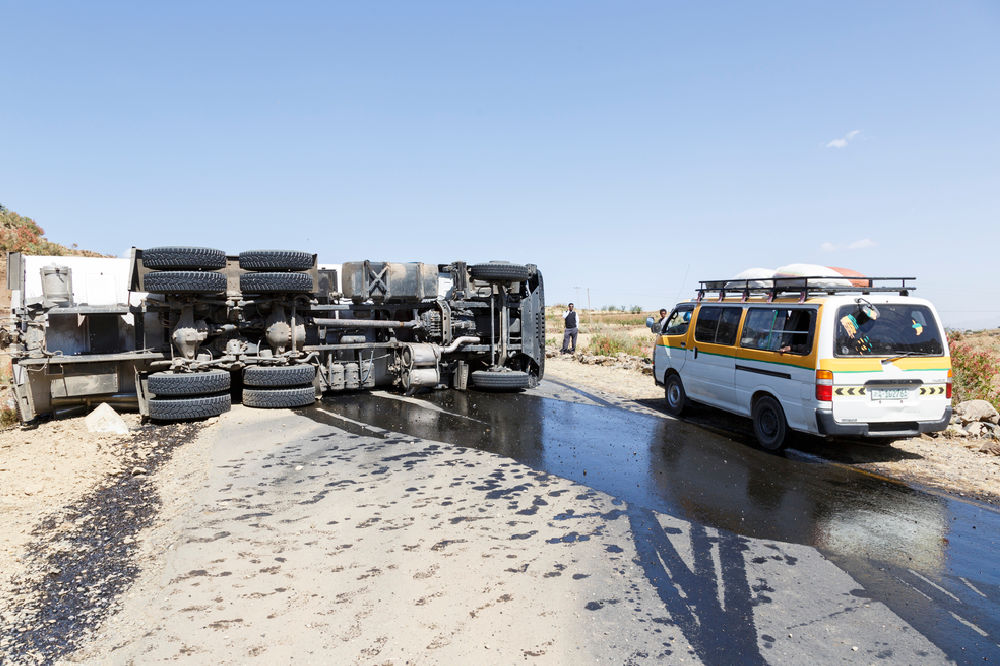While negligent driving can be a factor in truck accidents that result in a cargo spill, they can also be due to issues with the cargo, such as improper securement. When a cargo spill accident occurs, it can be even more devastating than any other truck-related accident. This is because not only do commercial trucks themselves weigh thousands of pounds, but with cargo, they can weigh up to 80,000 lbs.
When a passenger vehicle is involved in an accident with a truck, they are at higher risk of severe injuries and fatalities. In 2019, over 4,000 people died in truck-related accidents, with the majority of the deaths being passenger vehicle occupants.
However, seeking compensation for injuries or death after a cargo spill accident can be challenging. There are other potentially guilty parties to consider besides the truck driver, and any number of factors could have contributed to the accident. For this reason, it is highly recommended for victims and their loved ones to work with an experienced attorney to pursue legal action.
A personal injury attorney with experience handling trucking-related accidents can help you gather the necessary evidence to prove fault in a cargo spill accident. There may even be more than one party at fault that you can seek compensation from. Working with a personal injury lawyer will ensure all liable parties are held accountable so you will receive the full amount of compensation you deserve.
Dangerous Truck Cargo
The severity of a cargo spill accident will depend on the type of freight or cargo that the truck is hauling. Some of the more dangerous cargo loads that can lead to severe injuries and fatalities if spilled can include:
- Radioactive materials
- Corrosive materials
- Gas and oil
- Other flammable liquids and solids
- Toxic materials
- Heavy machinery
- Lumber
- Logging hauls
- Heavy pipes
- Boulders
Truck Cargo Regulations and Laws
The Federal Motor Carrier Safety Administration (FMCSA) has strict cargo securement rules and regulations in place to keep cargo spills from occurring. Some states may have their own additional set of regulations, but in Indiana, they refer to the FMCSA Driver’s Handbook on Cargo Securement.
The regulations on cargo securement in the handbook are as follows:
- The guiding principle is that cargo being transported on the highway must remain secured on or within the transporting vehicle.
- A driver may not operate a commercial truck until the cargo is properly distributed and adequately secured.
- The cargo must not:
- Obscure the driver’s view ahead, to the right, or to the left
- Interfere with the free movement of the driver’s arms or legs
- Prevent the driver’s access to accessories required for emergencies
- Prevent anyone from exiting the truck cab or driver’s compartment
- All cargo must be contained, immobilized, or secured so that it does not:
- Leak
- Spill
- Blow off the truck
- Fall from the truck
- Become dislodged
- Shift upon or within the truck to the extent that it affects the truck’s stability and maneuverability
- The securement system used must be appropriate for the cargo’s size, shape, strength, and other characteristics.
- The cargo must have sufficient structural integrity to withstand the forces of loading, securement, and transportation.
- To correctly contain, immobilize, and secure cargo, drivers must know how to:
- Properly transport cargo
- Load cargo
- Restrain cargo
- Use adequate securing devices
- Aggregate working load limit
- The driver must inspect and re-secure cargo if necessary pre-trip, within the first 50 miles, when duty status of driver changes, and at 3-hour intervals or every 150 miles.
Determining Fault After a Cargo Spill Accident
Though drivers are responsible for following the FMCSA handbook securement regulations, cargo spill accidents may not always be their fault, or they may only be partially liable. The parties that can carry responsibility and can be liable for paying compensation to a victim include:
- The driver: If the driver was driving negligently or failed to properly secure their cargo and perform inspections, they could be held liable.
- The truck company: If the trucking company pressured the driver to ignore regulations such as maximum load weight or driving hours, they could be held liable. They can also be held responsible if they did not ensure the truck was properly maintained if the accident was due to a malfunction.
- The shipping company: If the shipper or owner of the cargo did not ensure it was packaged correctly or had sufficient structural integrity before it was loaded, they could be held liable.
- The loading company: If a third party was used to help load the cargo and failed to secure it properly, they can carry some of the responsibility for the accident.
- The municipality responsible for maintaining road conditions: Local governments are responsible for maintaining safe road conditions. If the accident occurs due to poor road conditions, the local municipality where the accident occurred can be held liable.
Determining which party or parties were at fault for the cargo spill can be challenging. Working with an experienced attorney is often necessary as they can help you gather information and evidence necessary to prove fault.
Our Indiana Personal Injury Attorneys Are Here to Help
At Crossen Law Firm, we understand the physical and emotional damages that can impact your life after a severe cargo spill accident. Not only are these types of accidents traumatizing, but they can result in expensive medical bills and lost wages from being unable to work. For over 20 years, our team has worked tirelessly to help truck accident victims receive the compensation they deserve.
If you or a loved one has been in an accident, contact us on our website or call us today at (317) 401-8626 for a free consultation!

 317-401-8626
317-401-8626 
.jpg)